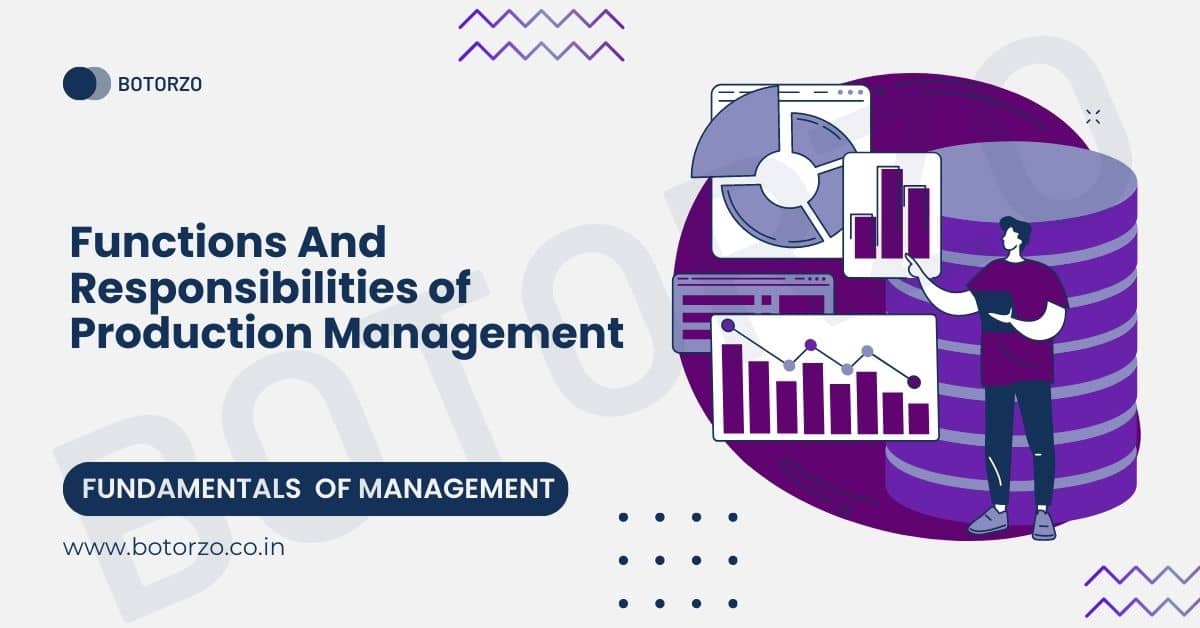Responsibilities of Production management include all aspects of organising, directing, and controlling the production procedures inside a company. In order to meet customer expectations, it is responsible for ensuring sure operations run smoothly, maximising the use of resources, and delivering high-quality products or services.
Read More About Production Management.
The Role of Production Management in Business Operations
Ensuring Efficient Production Processes
One of the key functions of production management is to guarantee that production processes are efficient. This includes analysing and optimising procedures, detecting bottlenecks, and applying operations-simplification methods. Production management leads to cost reduction and improved overall performance by removing inefficient practices and increasing productivity.
Resource Planning and Allocation
Production management is in charge of resource planning and allocation. It entails assessing the amount and timing of raw resources, equipment, and labour required for manufacturing. Production managers can avoid shortages, reduce inventory holding costs, and maintain a smooth production flow by managing resources efficiently.
Quality Control and Assurance
A fundamental obligation of production management is to maintain consistent product quality. Setting quality standards, employing quality control systems, and performing inspections throughout the manufacturing process are all part of it. Production managers may reduce defects, boost customer happiness, and protect the organization’s reputation by ensuring that quality criteria are met.
Responsibilities of Production Management
- Production Planning and Scheduling
- Inventory Management
- Equipment Maintenance and Upkeep
- Workforce Management
- Cost Control and Optimization
- Method Analysis
- Plant Layout
Production Planning and Scheduling
Production scheduling and planning are critical tasks of production management. Determine the production volume, sequence jobs, and allocate resources to satisfy client requests while optimising efficiency. Effective planning and scheduling contribute to shorter production lead times, better resource utilisation, and the fulfilment of production objectives.
Inventory Management
Another critical role of production management is inventory management. It entails keeping an ideal inventory level to suit consumer needs while avoiding excess stock or stockouts. To save costs and assure timely product availability, production managers must monitor inventory levels, use inventory management strategies, and build efficient replenishment operations.
Equipment Maintenance and Upkeep
industrial management is in charge of the upkeep and repair of industrial equipment. It includes planning preventative maintenance, dealing with equipment malfunctions, and assuring appropriate calibration and operation of machinery. Production managers can decrease downtime, repair costs, and optimise output by prioritising equipment dependability and performance.
Workforce Management
Workforce management is an important part of production management. It entails activities such as production worker recruitment, training, scheduling, and performance evaluation. To fulfil production objectives, production managers must assure an adequate and skilled staff, develop teamwork, and resolve any employee-related issues that may emerge.
Cost Control and Optimization
Cost control and optimisation are essential components of production management. It entails identifying cost drivers, analysing manufacturing costs, and adopting cost-cutting solutions while maintaining quality. To increase profitability, production managers must constantly review production costs, investigate options for waste reduction, and adopt cost-cutting initiatives.
method Analysis
There are various methods for producing a product. Some techniques are less expensive than others. Before deciding on the appropriate technique, the production manager should extensively examine all options.
Methods of analysis refer to the process of selecting the best alternative. Analysis methods are very beneficial in lowering production costs and enhancing corporate efficiency.
Plant Layout
Plant layout is primarily concerned with the proper internal arrangement of a business. It is related to order and correct organisation, as well as the use of existing resources, such as men, money, machinery, materials, and ways of manufacturing facility. To put it another way, it is concerned with maximum and effective production and use of available resources at the lowest possible operational cost
Frequently Asked Questions
What skills are essential for a production manager?
Production managers should have strong leadership, communication, and problem-solving skills. Knowledge of production processes and quality control techniques is also important.
How does production management contribute to business growth?
Effective production management improves operations, reduces costs, and enhances product quality, leading to increased customer satisfaction and business growth.
What metrics are used in production management?
Common metrics include production yield, cycle time, overall equipment efficiency (OEE), inventory turnover, and customer defect rates.
How can production management reduce waste and improve sustainability?
Production management uses lean practices to identify and eliminate waste, optimizing resource utilization and promoting sustainability.
Is production management applicable to both manufacturing and service industries?
Yes, production management principles apply to both manufacturing and service industries, adapting to the unique requirements of each sector.
Engineering Content From EngineeringAdda.in

